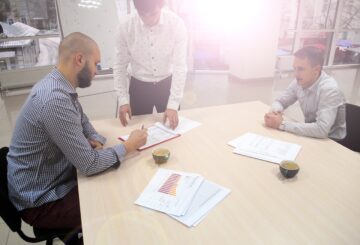
Korea is an exceptional country when it comes to the hiring process. While in the West, the application form often is only the start of the hiring process, in Korea the application essentially is the most important document you will submit to the company. The form is lengthy and can take up to five or six hours to complete. A hiring committee will determine your suitability for the position based chiefly on the application form.
If the form meets the company’s standards, you may be invited to undertake several company-specific tests. These tests are held only a few times a year, so it is important to check the company’s recruiting homepage for detailed information and to plan accordingly.
No two companies’ tests are the same, as each develops its own relevant to its specific areas of business. For example, Samsung Group applicants are required to take its Global Samsung Aptitude Test (GSAT), which is divided into five areas: language, mathematics, reasoning, visual thinking and work abilities. Foreigners can take the English version of the exam.
If you have satisfactorily completed the first two steps of the hiring process, you may be invited for an interview, which usually is the final step of the hiring process. Even so, because of increasing competition in the jobs market, many positions may require multiple rounds of interviews. Many companies have adopted even further steps in the process beyond the traditional interview, such as asking applicants to give a presentation on a specific topic, take part in role-playing interviews or engage in a discussion session with other candidates, all while being evaluated.
Before interviewing with a Korean company, you should have a clear picture of the company itself. Review the company’s history, business areas and other related information. This will allow you to ask relevant questions and make pertinent comments, which will demonstrate your interest in the business.
If possible, find out who your interviewers will be. It is considered good manners to show deference to the most senior person in the room. Greet your interviewers with a nod and perhaps a slight bow and, at the end, be sure to do the same. Thank them all for their time.
Interview Conduct
When going to a job interview in Korea, you should observe the following rules:
- Arrive on time. Plan to arrive 15 minutes before the scheduled interview time. Punctuality is important, as it shows respect. If it appears you will be late, call the company to alert your interviewers. You should not be surprised, however, if your interviewers arrive a few minutes late, as they are likely to be working under busy schedules.
- Present all documents, including business cards, to the employer with both hands.
- Remain respectful and polite. Keep your hands out of your pockets during the interview, and make frequent eye contact with your interviewers, as this will show sincerity and attentiveness. Be careful not to overdo it, however, as too much eye contact might be offensive to your interviewer.
- Be confident. Speak in a quiet, steady voice and avoid hand gestures. As always, you should appear to be modest, but not necessarily humble. Do not be afraid to accept praise, but at the same time, do not boast about achievements. Be aware that education is particularly well regarded by Koreans.
- Speak English slowly and clearly. While some Koreans do speak excellent English, they are not native English speakers, so during the interview you should be mindful of the phrases you use. Avoid slang or informal speech that may be confusing to your hosts.
- Dress well when interviewing. As a rule of thumb, dress formally, unless you are explicitly told to dress casually. First impressions and appearances matter in Korean business.
The Interview
In the past, Koreans typically would stay with one employer for a long time. Nowadays, however, a growing number of young people change jobs frequently. Despite this trend, employers still tend to take a great deal of care when considering a new employee. For this reason, there usually is at least one other person present during the interview, in addition to the interviewer. In large conglomerates, the recruitment process may take place before a panel of interviewers. This allows for a group assessment of the interview after the meeting. Interviews can take place individually or in a group setting.
If your resumé or CV indicates that you speak Korean, the interviewers will likely evaluate your language skills by conducting part of the interview in Korean. If you do speak Korean, prepare a one-minute self-introduction in the language. This usually would consist of your name, country of origin, a brief summary of past experience, your motivations for applying, and your personal goals upon employment.
In some companies, applicants give a presentation as part of the interview process. The candidate might be asked to prepare the presentation prior to the interview, or to prepare it “on the spot.” In the latter case, the company usually provides a topic, and the candidate is given 30 minutes to an hour to prepare for a ten-minute presentation.
As the interview is intended to confirm, rather than to explore, your suitability for the job, you may be asked some questions not directly related to the job. This is not unusual, so you should not be offended or caught off-guard by the questions, which may include personal subjects.
Questions may include:
- Tell me (us) briefly about yourself.
- Why do you want to work at our company?
- What are your strengths and weaknesses?
- How would previous co-workers describe you?
- Was there ever a situation where you were discouraged and frustrated?
- In what ways are your parents admirable and respectable?
- Describe the environment in which you were raised.
- Who is the most influential person in your life?
- Do you have many friends and acquaintances? Out of those friends, how many do you trust with your personal and intimate secrets?
- What role do you play within your social circle?
- What volunteer activities do you participate in?
- What are your hobbies? What type of sports do you enjoy?
- What do you consider the most important thing in life?
- Would you describe yourself as an extrovert or introvert?
- Do you enjoy group projects and activities?
- What salary do you expect?
- What was your first impression of our firm?
- What is your knowledge of our firm?
- Have you owned our products or received our services before? What is your assessment of our products and services?
- What books or periodicals have you read recently?
- Have you ever been laid off, fired or dismissed from a job?
- Describe the most difficult working environment you have experienced.
- What is your goal in life?
- (For a female) How are you going to find a balance between family and work? What is your plan after marriage?
- Do you have a role model in life?
- Describe your leadership experiences in the past
- What trends do you see in the future of our industry?
- Why should we hire you?
- What has been the biggest accomplishment in your life?
- How much do you drink?
- Do you prefer to work independently or on a team?
- Define what work-life balance means for you.
It is also very common for applicants to be asked personal questions about age, marital status, religion and the number of children in the family. This is a means through which your interviewer is trying to fit you into a social hierarchy, as the status of being of the oldest sibling commands higher respect.
It is helpful to give a lot of information when responding to questions.
An exception to the interviewing process described above is when a company or an organization is specifically looking for a particular job-related skill, such as the ability to speak English at a high level of fluency. In this case, the interview will be structured more along the lines of a relatively informal panel or group meeting. The goal of the interview will be to ascertain the presence of skills that cannot be identified clearly from paper, and may include several different segments, such as a case study or a debate.
Post Interview
Most of the large companies in Korea have a set timeline indicating when the application results will be made public. At the specified time and date, the results will be posted on the company’s website, allowing applicants to check the status of the job opening. Korea is an IT-friendly country, so a company’s recruitment process often can be followed entirely online. Some small and midsize companies will notify applicants through a phone call, text message or via email.
The decision-making process in Korea can be lengthy because of the number of applicants and the busy working environment. You should remain patient in waiting for a response. Some companies do not inform candidates who were not selected. If you have not received a phone call, a text message or an e-mail notification within two to three weeks, it is fair to assume that you did not get the offer. If you have not heard anything, however, it is acceptable to phone the company to see if a decision has been made, but do not do so until at least one week after the specified date for release of the results.
Follow @goinglobal Tweet to @goinglobal



